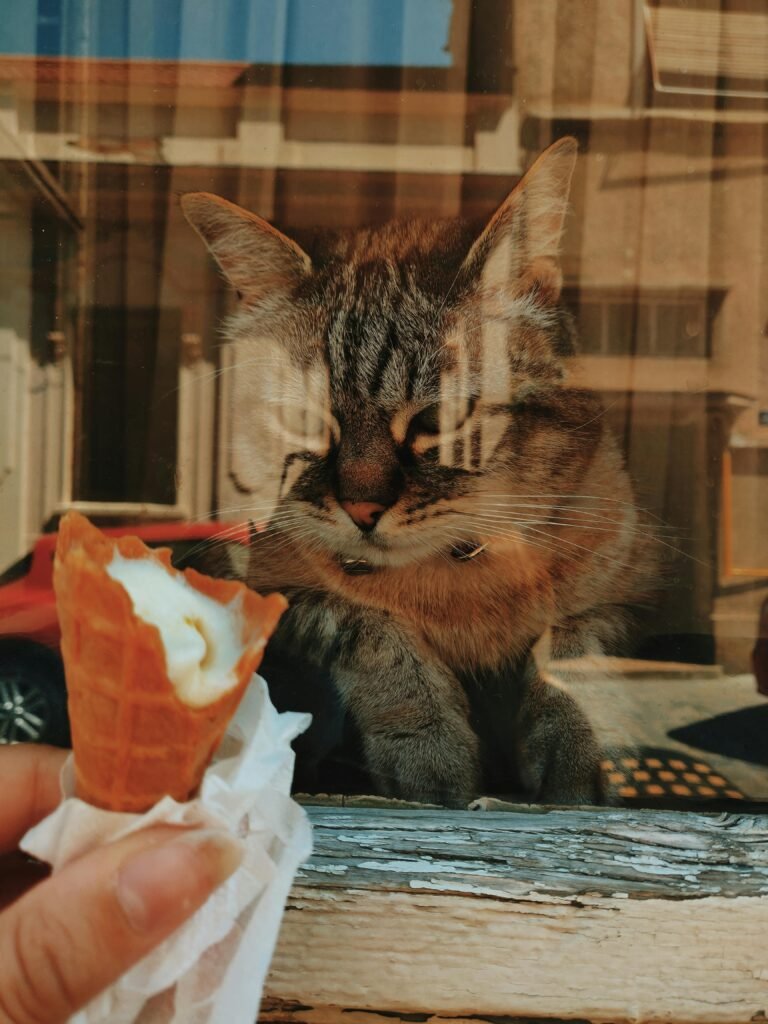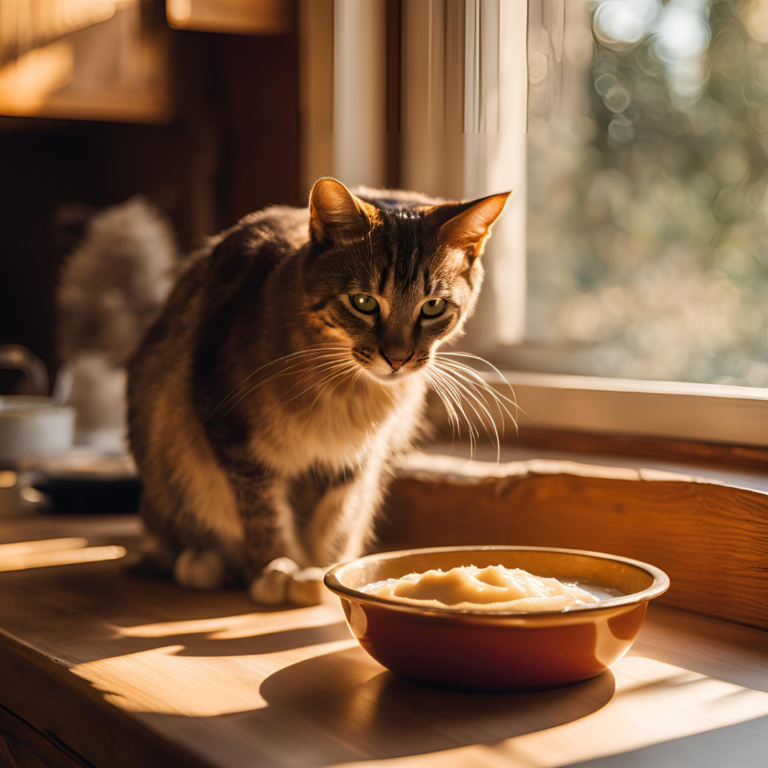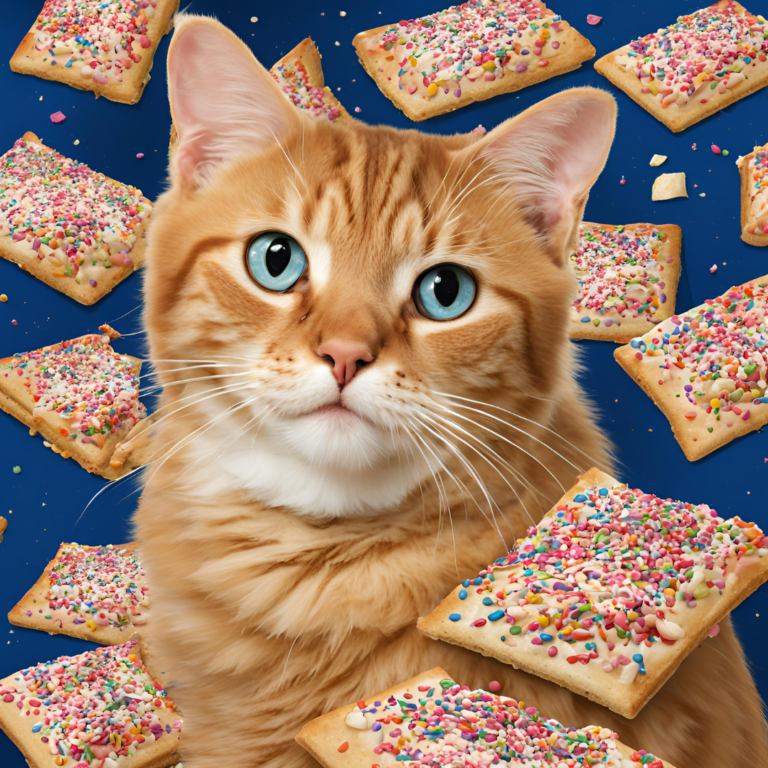We all eat ice cream to some extent, and it is a very favorite food among people. There is a huge demand for ice cream worldwide. However, pet parents might have a question about whether it is okay to give ice cream to cats or if ice cream can harm them. Therefore, today we will try to learn about this in detail.
Can cats eat ice cream?
Some cats may show interest in eating ice cream, but they should not be given ice cream. It should not be given to them even as a treat because ice cream is a dairy product that contains sugar, milk, and other ingredients that are harmful to a cat’s health. Ice cream has a high sugar content, which can lead to obesity, dental issues, diabetes, and upset stomach in cats. Additionally, the milk in ice cream can cause lactose intolerance in cats, meaning they cannot properly digest dairy products, resulting in vomiting, diarrhea, and other health problems. Veterinarians do not recommend giving ice cream to cats, so you should never attempt to give it to them. If your cat accidentally eats ice cream, monitor them closely and consult a veterinarian.
Do cats like ice cream?
Cats can sometimes be adventurous in trying new flavors, meaning some cats may show interest in eating ice cream. However, since ice cream is a dairy product and contains sugar, many cats might not show interest in eating it because cats cannot taste sweet things. Even if cats beg for ice cream, it should not be given to them, as dairy products like ice cream can cause digestive issues. Therefore, always avoid giving ice cream to your cat. If your cat eats a large amount of ice cream, seek help from a veterinarian.

What happens if a cat eats too much ice cream?
Since ice cream is a dairy product, it can be harmful to cats. While not all cats like ice cream, some indoor cats may show interest in eating it and can become ill as a result. Therefore, always refrain from feeding ice cream to your cat, even as a treat. However, if your cat steals or consumes a large amount of ice cream, here’s what might happen:
- Since ice cream is a dairy product, it naturally contains milk. However, many cats are lactose intolerant, meaning they cannot digest lactose. Therefore, if cats eat ice cream, they risk diarrhea, vomiting, stomach pain, upset stomach, and other health issues.
- We all know that ice cream contains high amounts of fat and sugar. Although ice cream is high in fat and sugar, its effects on cats are more significant than on us. Eating too much ice cream can lead to weight gain and obesity in cats, which can cause diabetes, joint problems, and other health issues.
- To enhance the flavor of ice cream, chocolate and other ingredients are often added, which can be harmful to cats, even in small amounts.
Since ice cream is harmful to cats, veterinarians do not recommend giving it to them. Therefore, never try to give your cat this human food. If your cat accidentally eats a large amount of ice cream and shows symptoms like vomiting, diarrhea, lethargy, or any abnormal behavior or signs of illness, contact a veterinarian.
Can cats get brain freeze from eating ice cream?
Yes, since ice cream is a dairy and cold food, cats can experience brain freeze from eating it. This typically occurs when very cold food (such as ice cream or other cold items) touches the palate. This causes the blood vessels to constrict rapidly and then expand, which triggers pain receptors and leads to a headache. Thus, ice cream can be harmful and painful for cats.
As ice cream is a cold and dairy product, eating it can cause signs of brain freeze in cats, such as shaking their head, pawing at their face or mouth, or appearing briefly disoriented. In addition to this, the high coldness of ice cream can cause dental sensitivity in cats. Therefore, avoid giving ice cream to cats and consider safer treats for your beloved pet. If needed, consult with a veterinarian for recommendations on safe treats.
Why do cats show interest in eating ice cream or other sweet foods?
Cats generally cannot taste sweetness, but some cats may show interest in sweet foods, including ice cream. Let’s explore the reasons why they might be interested in eating ice cream and other sweet foods:
- Although not all cats show interest in eating ice cream or other sweet foods, some cats may find these foods appealing due to their high fat content. Ice cream and many sweet foods are high in fat, which can be attractive to some cats.
- Cats are curious creatures, so there is a possibility that some cats may try to eat ice cream or other sweet foods out of curiosity. Cats often show interest in trying new foods, especially when humans eat those foods in front of them. When people eat ice cream or other sweet foods in front of cats, the cats may want to investigate and sample the food, leading to their interest or insistence on trying it.
- Ice cream and many other sweet foods are dairy products, which can be attractive to some cats. The smell and taste of dairy products can prompt some cats to beg for these foods, even though cats should not eat dairy products.
Your cat, like other cats, may show interest in eating ice cream or other sweet foods, but remember that these foods can be harmful to their health. Never attempt to give them ice cream or other sweet foods. If your cat eats ice cream or other sweet foods, consult a veterinarian for advice.

Can excessive ice cream consumption make cats unruly?
The answer is yes, excessive ice cream consumption can make cats unruly. They may become addicted to high-fat foods like ice cream and gradually refuse to eat their regular meals.
Since cats are obligate carnivores, their diet must include meat. On the other hand, ice cream is a nutritionally poor food for cats and does not provide essential nutrients. Additionally, ice cream is a dairy product, and consuming it can lead to various health problems and malnutrition in cats. Therefore, ice cream should never be given to cats, and it is best to avoid feeding them ice cream.
Conclusion
Ice cream is generally a human food specifically made for people and is not suitable for cats. Therefore, you should not try to give ice cream to cats, not even as a treat. Consuming ice cream can lead to various health issues for cats, which no pet owner would want for their feline companions. As a cat owner, you should provide your beloved cat with safe foods or treats that offer necessary nutrition instead of ice cream. If needed, consult with a veterinarian, who can assist in choosing the right diet for your cat.



